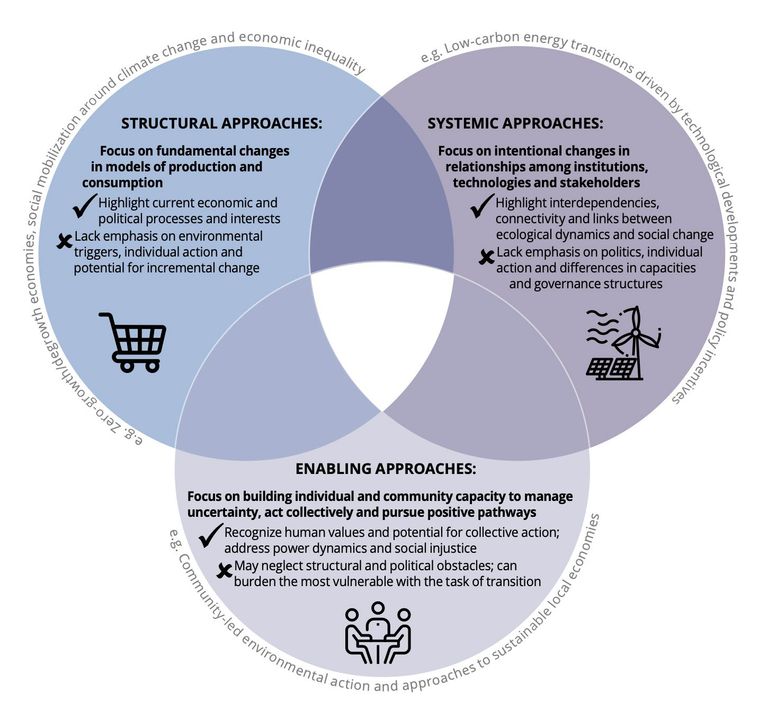Societal transformation to sustainable development
Profound transformations are needed for societies to become more sustainable. Such sustainability transformations are explored in the context of transformation research, transformative research, and related approaches. This website offers guidance on research into sustainability transformations. It explains terms and provides examples to aid understanding. Selected in-depth examples help to illustrate what constitutes research on sustainability transformations.
Contatto
Dr. Gabriela Wülser
SCNAT
Iniziativa per la ricerca sulla sostenibilità (SRI)
Casa delle Accademie
Casella postale
3001 Berna
Who is doing research on sustainability transformations?
A search using the snowball method shows the following: Researchers who mention sustainability transformations in their projects, publications, or research interests may be found at virtually all institutions of higher education in Switzerland. They are active in the following research fields:
- Energy, electricity, mobility
- Biodiversity, environmental protection, ecology
- Agriculture
- Spatial planning and development, land management, (landscape) architecture
- North–South relations, migration
- Sustainable consumption, sustainable behaviour
- Economics, finance, industrial dynamics
- Organizational studies, leadership
- Sociology
- Governance
- Philosophy
- Art, video
- Transdisciplinarity
A list of projects on sustainability transformations by researchers from the Academies network may be found here:
Transboundary research partnerships between researchers and practitioners from different countries have a long tradition in the exploration of sustainability transformations.
Examples of North–South research partnerships:
One strand of inquiry among sustainability researchers is dedicated to the question of how research, teaching, and universities themselves can be made more sustainable in order to support sustainability transformations.
- Creating leadership collectives for sustainability transformations
- Rethinking science for sustainable development: Reflexive interaction for a paradigm transformation
- Transforming knowledge systems for life on Earth: Visions of future systems and how to get there
- Factsheet 5 Research and Education: Drivers of Transformation
- saguf_discussion_paper_transformative_learning
- Learning for Transformation - ein Manifest
- The Normative Dimension in Transdisciplinarity, Transition Management, and Transformation Sciences: New Roles of Science and Universities in Sustainable Transitioning.
- Centre for Development and Environment (CDE): Research focus 'transformation of science'
- Safe Spaces for Disruptive Learning in a North–South Research Partnership Context: International Mobility of Doctoral Students
- Research and Practice for Sustainable Development
- Transdisciplinary transformative change: an analysis of some best practices and barriers, and the potential of critical social science in getting us there
The Declaration on Research Assessment (DORA) calls, among other things, for funding applications not to be assessed (solely) on the basis of impact factors, but rather to consider the research output in its entirety (incl. scientific outreach, conference contributions, collaboration with stakeholders).
The Better Science Initiative promotes a scientific culture characterized by fairness, respect, diversity, and holistic assessment. Among other things, it articulates ten calls to action for science culture.
The global Transformations Community brings together experienced (action) researchers and professionals to advance transformations towards sustainability.
Co-founded by Swiss researchers, the international “Sustainability Transitions Network” promotes transition research through knowledge building, education, exchange, and outreach.
“Theatre of Transformation - Enacting Global Transformation” seeks to challenge dominant paradigms and shape new paradigms that promote sustainability. It brings together academics, decision-makers, practitioners, and other interested parties.
At the international level, there are funding programmes that specifically support research on sustainability transformations, such as the “Transformation to Sustainability” programme or “Cofund Urban Transformation Capacities”.
In Switzerland, there is currently no research funding tailored explicitly to sustainability transformations. However, the recommendations for funding opportunities offered by the Sustainable Research Initiative (SRI), the Swiss Alliance for Global Research Partnerships (GRP-Alliance), and the Network for Transdisciplinary Research (td-net) may also be useful for research on sustainability transformations.
This list is not complete. Do you have suggestions for additions? Please contact: .
Where can I find relevant literature on sustainability transformations?
In early 2022, we asked researchers in the SCNAT network about the most relevant literature on transformation research or transformative research. A heterogeneous picture emerges.
Several of the articles mentioned in the survey are published in the journals “GAIA – Ecological Perspectives for Science and Society” and “Environmental Innovation and Societal Transitions”.
The reports of the German Advisory Council on Global Change are often frequently used as a reference by researchers in Switzerland.
How do transformation processes occur? The following publications provide an overview of concepts and explanatory approaches.
Differentiation between structural, systemic, and enabling approaches:

The International Science Council has summarized the findings of Scoones et al. (2020) in a Knowledge Brief.
Distinguishing between three conceptual frameworks on transformations:
- Transformations in socio-ecological systems
- Socio-technical transitions
- Socio-economic transformations
The European Environment Agency describes these frameworks as well as two other perspectives, summarized for Swiss audiences by Bader et al. (2019).
Literature tips on the meaning of various terms may be found here:





